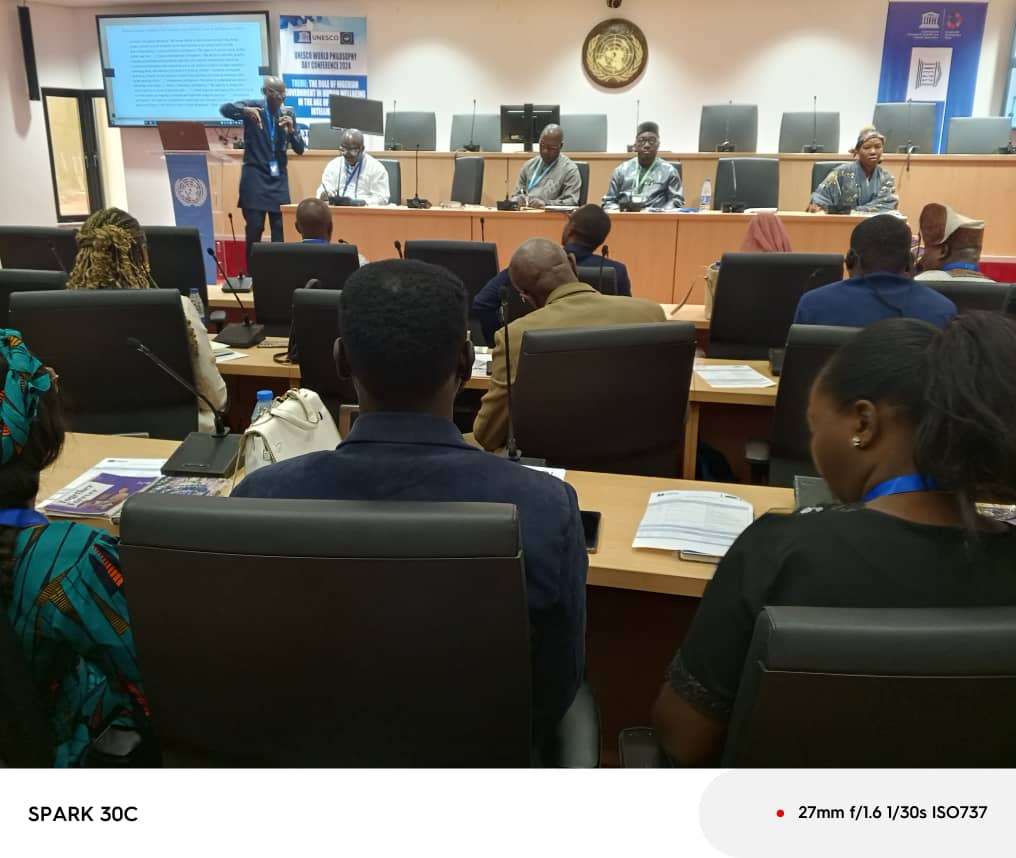
By Francis UDOAKPAN
The 2024 World Philosophy Day was commemorated in Abuja through a collaborative effort between the UNESCO Office in Nigeria and the Social and Political Philosophy Academy of Nigeria (SPPAN), led by Professor Ephraim Stephen Essien. The event focused on the theme “The Role of Nigerian Government in Human Well-Being in the Age of Artificial Intelligence,” emphasizing the regulation of AI for the benefit of humanity.
In his welcome address, UNESCO’s representative in Nigeria, Mr. Abdourahamane Diallo, underscored the organization’s commitment to ensuring ethical AI use. He highlighted UNESCO’s 2021 recommendations, which introduced two critical tools: the Readiness Assessment Methodology (RAM) and the Ethical Impact Assessment (EIA). These frameworks aim to balance AI advancements with human rights considerations.
“UNESCO is working diligently to establish policy frameworks that curb the excesses of AI in our contemporary society,” Diallo stated, emphasizing the organization’s proactive approach in addressing AI’s societal impact.
Speaking earlier, SPPAN President Professor Ephraim Stephen Essien, in his opening remark, outlined the significance of the event. He stressed the need for ethical AI practices in Nigeria, describing this year’s theme as particularly relevant given the rapid penetration of AI technologies across various sectors.
“This year’s theme is apt, as it draws attention to the growing influence of AI and the urgent need to address its ethical implications for the well-being of Nigerians,” Essien noted.
During the event, the keynote speaker and acting Vice Chancellor of the University of Abuja, Professor Aisha Sani Maikudi, represented by the Deputy Vice Chancellor Administration, Professor Phillip Afaha, highlighted in his Boss presentation that given the celebration of the World’s Philosophy day, attention has turned to the critical role of the Nigerian government in safeguarding human well-being amid the rapid rise of artificial intelligence (AI). This year’s theme, “The Role of the Nigerian Government in Human Well-Being in the Age of Artificial Intelligence,” he acknowledged the urgent need for strategic governance to address the profound societal implications of AI.
Prof. Afaha noted that Artificial intelligence is revolutionizing every aspect of daily life, from healthcare and education to communication and employment. However, with its potential to make decisions previously reserved for humans, AI raises significant ethical, social, and political questions. How can Nigeria leverage AI to enhance human flourishing while preserving core societal values and addressing unique local challenges?
Drawing from Aristotle’s concept of eudaimonia—a life of purpose and fulfillment—the government is tasked with navigating the complexities of this digital age to ensure AI technologies promote dignity and equitable progress.
Regarding Policy and Ethical AI governance; Prof. Maikudi calls on Nigerian government to develop robust legal frameworks to guide AI use. Policies should address issues such as privacy erosion, algorithmic bias, and discrimination. Transparent and accountable regulations will ensure AI technologies promote fairness, equity, and justice, rather than deepen social inequalities.
On Data Protection and Sovereignty: Prof. Maikudi noted that
AI relies on vast data and this raises concerns about privacy and ownership. Safeguarding Nigerians’ data and ensuring it is controlled within national borders is essential. Adopting frameworks akin to the EU’s GDPR would protect citizen rights and foster trust in AI systems
Central to his presentation was a philosophical commitment to human-centered values. Technology must serve humanity, not dominate it. The government’s role is to ensure AI advancements align with principles of respect, empathy, and equity, preserving human dignity in the face of rapid technological change.
He also emphasized that AI governance requires international cooperation. Nigeria must engage with global stakeholders—UNESCO, technology firms, and civil society—to craft ethical AI frameworks. Active participation in global dialogues will allow Nigeria to contribute its unique perspectives while benefiting from international expertise.
As Nigeria stands on the cusp of the AI revolution, its government must adopt a visionary and ethical approach. By prioritizing human well-being, fostering equitable development, and embedding philosophical reflections into policymaking, Nigeria can ensure that AI serves as a force for collective progress, enabling every citizen to achieve their full potential. He added.
On this World Philosophy Day, Prof. Maikudi noted that the message is clear: humanity must guide technology, not the other way around. Nigeria’s leadership in the ethical governance of AI will be critical in shaping a future where technological advancements uplift society and promote a thriving, inclusive nation.
Following the presentation of the keynote speaker, a renowned academia, thought leader, and lead paper presenter, Prof. Lawrence Ogbomoso Ugwuanyi, delivered a compelling lead paper presentation at the UNESCO World Philosophy Day event, focusing on the intersection of ethics, science, and human well-being in the age of artificial intelligence (AI).
In his address titled “Ethical, Scientific, and Well-Being Imperatives of Artificial Intelligence,” Prof. Ugwuanyi explored the transformative potential of AI and its profound implications for society. He emphasized that while AI offers revolutionary advancements in all fields, it also presents significant ethical challenges that require urgent attention.
Highlighting the scientific potential of AI, Prof. Ugwuanyi pointed to its applications in the well being of humans. However, he cautioned that scientific innovation must be balanced with societal needs, ensuring equitable access to AI-driven solutions.
Central to his presentation was the notion that AI should enhance human well-being, not undermine it. He called for a holistic approach that integrates ethical reasoning, scientific innovation, and a commitment to addressing societal disparities. “True progress is not measured by technological advancements alone but by how they improve the quality of life for all,” Prof. Ugwuanyi stated.
Concluding his presentation, Prof. Ugwuanyi called for a multi-stakeholder approach to AI governance, involving governments, academia, private sectors, and civil society. He urged Nigeria to take a proactive role in shaping ethical AI policies that reflect the country’s unique cultural values and challenges.
Prof. Ugwuanyi’s insights underscored the critical need for balance between innovation and humanity in navigating the complexities of the AI era.
The event’s climax was marked by an award presentation recognizing distinguished individuals who have made exceptional contributions in their respective fields. Among the notable awardees were:
Rt. Hon. Tajudeen Abbas, PhD, GCON, Speaker of the House of Representatives, who was represented by Barr. Jesse Okey-Joe Onuakalusi, the House member representing Oshodi/Isolo II Federal Constituency of Lagos State.
Hon. Mohammed Badaru Abubakar, CON, mni, the Honourable Minister of Defence, represented by Adebola Odugbesan, Esq., Director of Legal Services in the Ministry of Defence.
Prof. Aisha Sani Maikudi, Acting Vice Chancellor of the University of Abuja, represented by Prof. Philip Afaha, Deputy Vice Chancellor (Administration), University of Abuja.
Prof. Nkereuwem Etukudo, Provost of the Federal Medical Laboratory Sciences, Jos, Plateau State.
The ceremony also witnessed the presence of key dignitaries, including:
Nneka Okafor, Officer-in-Charge of Human and Social Sciences at UNESCO.
A representative of the UNESCO Representative to Nigeria, Mr. Abdourahamane Diallo.
Prof. Otoabasi Akpan, Deputy Vice Chancellor of Akwa Ibom State University.
The event underscored the importance of excellence and innovation in leadership and service, with each honoree celebrated for their remarkable impact across diverse sectors.
The award presentation set the tone for a break out session, sparking meaningful discussions about the future of AI and its implications for ethical governance and human flourishing.
The event served as a platform for critical discourse on the ethical governance of AI, highlighting its potential impact on human well-being and the importance of aligning AI advancements with societal values.










